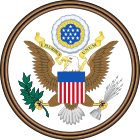Sheppard Bone-Dry Act facts for kids
 |
|
| Long title | An Act to prevent the manufacture and sale of alcoholic liquors in the District of Columbia, and for other purposes. |
|---|---|
| Nicknames | District of Columbia Prohibition Act |
| Enacted by | the 64th United States Congress |
| Effective | March 3, 1917 |
| Citations | |
| Public law | 64-383 |
| Statutes at Large | 39 Stat. 1123 |
| Legislative history | |
|
|
The Sheppard Bone-Dry Act was a law passed by the United States Congress in 1917. This act made it illegal to make or sell alcoholic drinks in the District of Columbia. It was named after Senator Morris Sheppard from Texas, who supported the law. This law was an early step in the movement to ban alcohol across the entire United States.
Contents
What Was the Sheppard Bone-Dry Act?
The Sheppard Bone-Dry Act was a special law for Washington, D.C. It stopped the creation and sale of all alcoholic drinks in the nation's capital. This included beer, wine, and spirits. The law went into effect on March 3, 1917.
Why Was This Law Created?
This act was part of a bigger movement called Prohibition. Many people in the United States believed that alcohol caused many problems. Groups like the Women's Christian Temperance Union worked hard to ban alcohol. They thought it would make society better and safer.
The idea of Prohibition was to improve public life. Supporters believed that banning alcohol would lead to less crime. They also thought it would make families stronger. This movement grew very popular in the early 1900s.
Who Was Senator Morris Sheppard?
Senator Morris Sheppard was a politician from Texas. He was a member of the Democratic Party. He strongly believed in the Prohibition movement. He worked hard to pass laws that would ban alcohol.
Sheppard introduced the bill for this act in the Senate. He was a key leader in getting it approved. His efforts helped make the District of Columbia "dry." This meant no alcohol was allowed there.
What Is the District of Columbia?
The District of Columbia is a special area in the United States. It is not part of any state. It is where the nation's capital, Washington, D.C., is located. The U.S. Congress has direct control over its laws.
Because Congress controls D.C., it was often a testing ground for new laws. If a law worked well in D.C., it might then be considered for the whole country. This is why the Sheppard Bone-Dry Act focused on D.C. first.
How Did the Act Become Law?
The journey of the Sheppard Bone-Dry Act began in the Senate. Senator Sheppard introduced the bill on February 11, 1916. After discussions, the Senate voted on it. They passed the bill on January 9, 1917. The vote was 59 in favor and 34 against.
Next, the bill went to the House of Representatives. The House also voted to approve the bill. This happened on February 28, 1917. The vote was 276 in favor and 143 against.
Finally, the bill went to President Woodrow Wilson. He signed it into law on March 3, 1917. This made the Sheppard Bone-Dry Act an official law. It marked a big win for the Prohibition movement.
What Happened After This Law?
The Sheppard Bone-Dry Act was a step towards national Prohibition. Just two years later, in 1919, the 18th Amendment was passed. This amendment banned alcohol across the entire United States.
The 18th Amendment started the era known as national Prohibition. This period lasted from 1920 to 1933. During this time, it was illegal to make, sell, or transport alcoholic drinks anywhere in the U.S. The Sheppard Bone-Dry Act showed that a ban on alcohol could be put into place.

